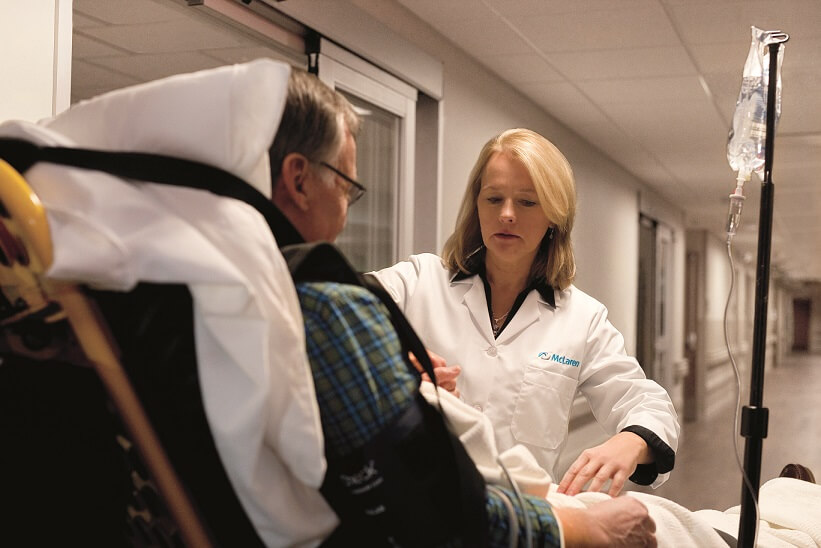Emergency Department
How Emergency Care Starts

Your treatment begins as soon as you step into the emergency department. Upon your arrival, the seriousness of your condition will be assessed by our trained staff and by a medical professional in “triage.” Most of the time this process includes a nurse and a nurse practitioner or physician assistant.
The “triage” process allows patients with the most life-threatening problems to receive the care they need as fast as possible. We DO NOT see patients according to their time of arrival. All patients are important to us, but priority must be given to those with the most serious conditions.
After being seen in triage, patients will be placed in an exam room or remain the waiting area to receive care, depending on the availability of beds and the seriousness of the injury or illness.
Our experienced emergency department staff may begin medical assessments for those in the waiting room to expedite care. This may include receiving some medications to help manage symptoms and the ordering of tests needed to help further diagnose the patient. These tests may include blood work, X-ray’s, CT scans and more.
When Emergency Care is Delivered
During times of high patient volume, you may be asked to wait in the waiting room and even receive care there as well. Our goal is to provide life-saving care to those with serious injuries and conditions and get all patients feeling better quickly and safely. Wait times depend on how busy the department is at the time, and the number of patients whose conditions may be more serious than yours. At times, the waiting room may appear quiet, but this doesn’t mean the emergency department isn’t busy.
We understand waiting can be frustrating and we do our best to keep wait times to a minimum. If you feel your condition changes during your wait, please alert the triage nurse so that they may reassess you.
Important Items to Share
The emergency department staff is not aware of your medical background so you may be asked numerous questions. To ensure accuracy and safety, you may also be asked questions more than once. Common items addressed during our assessment of our health include:
- Any health problems that you have
- Allergies to medication or environment
- All drugs and treatments you are using
- If you are pregnant/may be pregnant or are breastfeeding
- Any recent trips overseas
Please avoid food and drink as you may need tests or procedures that require fasting or avoiding liquids. If you have questions, please ask the triage staff.
Also, please notify staff if you wish to leave the department at any point.
Committed to a Healing Environment
We are committed to providing a positive, friendly environment for patients, visitors and staff.
No acts of violence, foul language, threats or verbal abuse toward another patient, guest or staff member will be tolerated. Failure to comply may result in removal from the facility and prosecution.
Comments or Concerns About Care
If you have concerns regarding your treatment, please ask our staff so it may be addressed promptly. If you still feel that you have had an unsatisfactory experience, you may contact a member of our patient experience team to discuss your experience.
Contact a Patience Experience Representative
The Right Care at the Right Time
Emergency Room
An emergency is a serious symptom or medical condition that is caused by an illness or injury. Most emergency departments are open 24/7, as patients may arrive any time. For serious injuries or medical conditions, you should go to an emergency room. These include, but are not limited to:
- Signs and symptoms of a stroke, including sudden numbness in an extremity
- Symptoms of a heart attack, including chest pain and/or shortness of breath
- Seizures or loss of consciousness
- Severe injuries, such as fractures or head trauma
- Vomiting or coughing up blood
- Deep cuts or bleeding that won’t stop
- Severe burns
- Severe abdominal pain
McLaren Emergency Room Locations
Urgent Care
Urgent care centers are usually used to treat patients with medical conditions that require immediate attention, but are not serious enough to warrant a visit to an emergency room. Conditions that may be effectively treated at urgent care centers include:
- Sprains and strains
- Infections, including urinary tract or respiratory infections
- Minor cuts with controlled bleeding
- Colds, coughs and sore throat
- Flu symptoms and/or fever
- Skin rashes and minor injuries
Most urgent care centers have extended hours, including evenings and weekends, and offer walk-in appointments.
When in doubt, patients who feel their symptoms require immediate medical attention may choose to go to a hospital emergency department, where medical professionals can determine which level of care is required.
Urgent Care | Walk-In Clinic Locations
McLaren Stroke Network
McLaren is dedicated to delivering the highest quality of care to our stroke patients. The clock starts ticking upon the first signs of a stroke. For every minute a stroke is left untreated, millions of brain cells die. The key to maximizing your outcome after stroke symptoms begin is to immediately call 9-1-1 so you can get to the Emergency Department as soon as possible.
McLaren Stroke Network Locations
McLarenNow Virtual Visit
See a board certified physician using secure video anytime, anywhere on your smartphone, tablet, or computer with a webcam. McLarenNow virtual visits are available for urgent care situations such as COVID-19 screening, cold, flu, minor injuries, illness or skin conditions.
Start your visit
McLaren Now+Clinic Clinics at Walgreens
McLaren Now+Clinic clinics offer high quality, efficient, and cost-effective care for minor illnesses, injuries, wellness physicals, health screenings, vaccinations, rapid PCR COVID/Flu tests, and a full array of laboratory tests for patients age two and older.
McLaren Now+Clinic Locations